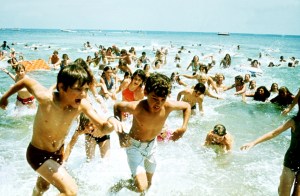One fish, two films.
The massive 1975 hit Jaws will get a pair of documentaries to mark the 50th anniversary of the Steven Spielberg film. One of them, Jaws: Making a Splash in Hollywood, tossed chum in the water at Sunny Side of the Doc last week – looking for a bite from potential buyers at the documentary marketplace event in France.
News of that film, from distributor Newen Connect and directed by French filmmakers Olivier Bonnard and Antoine Coursat, comes just days after Deadline’s exclusive report that National Geographic is green lighting another documentary about the blockbuster, under the working title Jaws @ 50.
‘Jaws’
Courtesy Everett Collection/Universal
Chloé Persyn, head of factual distribution for Newen Connect, says the cinematic ocean’s big enough for both films.
“I would strongly believe there is room for two different documentaries with a different angle,” Persyn tells Deadline. “We already know that now, being at Sunny Side where we launched the project to look for international partners, there’s room and an appetite from our buyers around the world.”
NatGeo’s doc is being produced by Spielberg’s Amblin Documentaries and Nedland Media. The “rival” shark tale — a Capa production for Arte France — will feature vintage interviews with Spielberg and actor Richard Dreyfuss (“Matt Hooper”).
“We could not interview Steven Spielberg because he was doing his own documentary, but we have wonderful archives,” says producer Maud Gangler. “So, we have him in another way.”
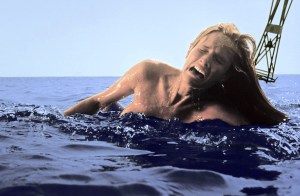
Actress Susan Backlinie in ‘Jaws’
Courtesy Everett Collection/Universal
Jaws: Making a Splash in Hollywood will feature fresh interviews with Wendy Benchley, marine conservationist and widow of Jaws author Peter Benchley, Jaws screenplay co-writer and actor Carl Gottlieb, actress Lorraine Gary, who played Ellen Brody, and Ian Shaw, son of Robert Shaw, aka “Quint.” Ian Shaw wrote the Broadway play The Shark Is Broken about the relationship of his dad, Dreyfuss, and Roy Scheider (“Brody”) on set.
Directors Bonnard and Coursat also interviewed Joe Alves, production designer of Jaws (he also directed the third Jaws film).
“He’s basically Mr. Shark,” Bonnard says of Alves. “Everything about the shark malfunctioning and everything, he was in charge of that. So, he has a very interesting point of view on the whole shoot.”
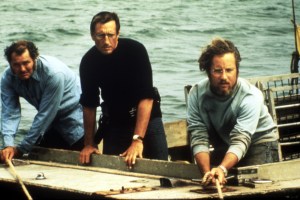
L-R Robert Shaw, Roy Scheider, Richard Dreyfuss in ‘Jaws’
Courtesy Everett Collection/Universal
They also spoke with writer Matthew Robbins, who contributed to the Jaws screenplay. He wrote Spielberg’s first big-screen film, The Sugarland Express (1974), and he contributed to the screenplay of Close Encounters of the Third Kind (1977), the Spielberg films that came before and after Jaws.
“[Robbins] was part of that generation, of the new Hollywood,” Bonnard notes, “and he was really great at sharing with us what it felt like to be part of that group at that time, at that place in California. They really wanted to change everything, and they had, let’s say, different ways to go about it.”
The thrust of Jaws: Making a Splash in Hollywood – what it sinks its teeth into – is the way Jaws dramatically changed Hollywood, spurring the studios to focus virtually their entire attention and business model on creating gigantic hits.
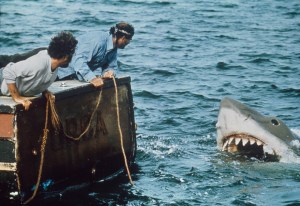
From left: Richard Dreyfuss, Robert Shaw in ‘Jaws’
Courtesy Everett Collection/Universal
“There’s a before and an after Jaws,” Bonnard says. “Very unknowingly, but Spielberg basically made the very first blockbuster… It was a very realistic movie shot entirely on location with actors who were not huge stars at the time. And yet it’s the template for the big Hollywood blockbusters that Star Wars and Raiders of the Lost Ark and everything are going to build upon.”
The directors suggest Hollywood drew the wrong conclusions from Jaws’ success.
“This movie, which is like a happy accident, a series of happy accidents, Hollywood basically tries to make it into a formula. And there’s no encapsulating that magic again,” Coursat maintains. Adds Bonnard, “Very, very often I think Hollywood tended to forget that Jaws also had some very, very well drawn characters and the first half of the movie is setting up those characters, the dynamics between them, which ultimately pays off so well in the second half.”
Hollywood’s pursuit of the tentpole, to the exclusion of just about everything else, has given us the Marvel and DC “universes” among other decidedly mixed cinematic accomplishments.
“It is kind of like the side effects of that revolution,” comments Bonnard. “Funny enough, Spielberg himself I think, and Lucas for example, are pretty critical of those side effects – again, unknowingly, that they created a monster basically that we’re seeing right now the latest stage of that monster, which is probably the superhero movies.”
Laurent Bouzereau is directing National Geographic’s Jaws @ 50 (wt). His credits include Faye — the soon-to-be-released film about Faye Dunaway — an upcoming film on Jaws composer John Williams, and Timeless Heroes: Indiana Jones and Harrison Ford.
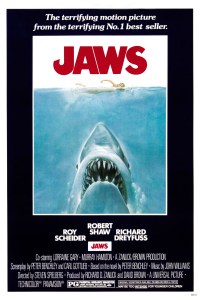
JAWS, 1975
Courtesy Everett Collection/Universal
Bonnard says magnanimously of the Bouzereau film, “It is going to be very well done. I feel it probably will be another ‘making of’ with fresh material. But we are not doing a making of. It’s really not so much about the ‘how’ but about the ‘why.’ About Jaws 50 years down the road. Very few movies are that enduring. Back to the Future may be another one. Jaws is the new Wizard of Oz, basically.”
Its appeal has extended well beyond the shores of (fictional) Amity Island, crashing ashore around the world. “It’s as huge in Europe as in America,” says producer Maud Gangler.
“It’s a cult movie that has marked our collective pop culture,” adds Newen Connect’s Persyn. “And this is why [the documentary] will be a success on the international market.”

Lorraine Gary and Roy Scheider in ‘Jaws’
Courtesy Everett Collection/Universal
Gangler says what Jaws: Making a Splash in Hollywood will offer is a different perspective on the classic. “We have insiders, so we’re quite proud to have Carl Gottlieb, Lorraine Gary, that’s cool for us,” she says. “And it’s a point of view of two French directors. They have a lot of experience in cinema, both of them. So it’s not le regard of Steven Spielberg, but the regard is already interesting.”
Notes Bonnard, “We are looking at why Jaws was such a phenomenon at the time and to this day, it’s pretty incredible. It’s very, very few select films that have that kind of a legacy, such an enduring echo.”

